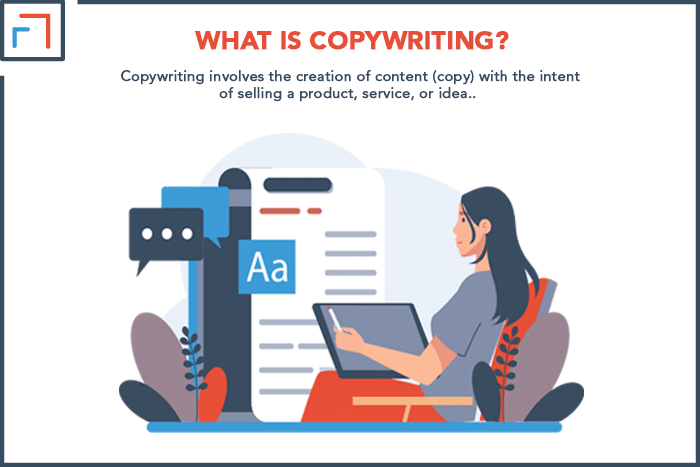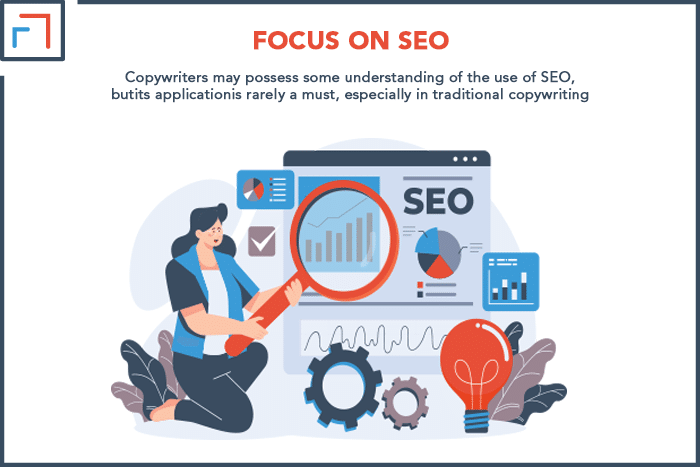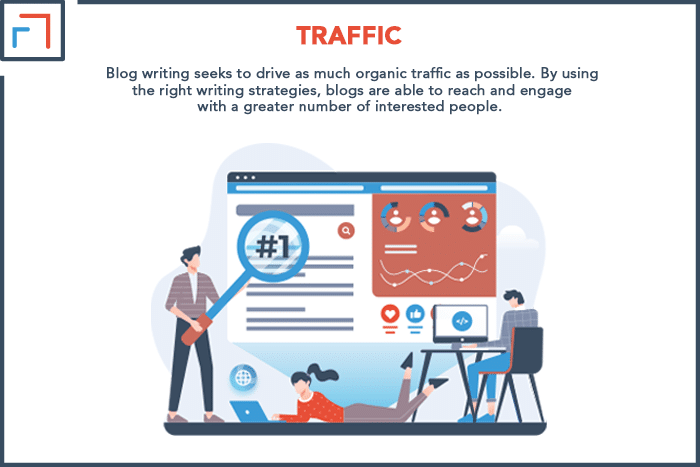Blog writing and copywriting are among the most demanded skills in the modern workplace. If you are looking to venture into a writing career, you might wonder which option is best for you. The best way to get started is by understanding what sets these two disciplines apart.
Blog writing enables you to share text in the form of blog posts to inform and entertain the audience. Copywriting, on the other hand, focuses on selling an idea, product, or service through persuasion. Copywriting also involves the use of ad space. Both forms of writing have a unique role to play.
In this post, we will compare and contrast blog writing and copywriting. We will also discuss how to choose which type of writing might be best for you. Let’s dive in!
Blog Writing vs Copywriting: What Are They?
On the surface, blog writing and copywriting may seem similar because both involve writing content for an online audience.
But in practice, these two are distinct processes. They have some similarities, but there are also many differences.
1. What Is Copywriting?
Copywriting involves the creation of content (copy) with the intent of selling a product, service, or idea.
The copy is written in a way that persuades and convinces its readers to take a particular action that would eventually lead to a conversion of some sort.
Although the foundations of copywriting have been around for centuries, early copywriters started using it for advertising and marketing around the 20th century.
You can know more about advertising copywriting in my article on copywriting for ads.
Over time, these writers evolved into professional copywriters as the practice of advertising became more demanding.
Nowadays, copywriting is widely used to create awareness about a brand, attract customers’ trust and increase conversions.
Copywriting requires the copywriter to possess certain skills that enable them to write creatively and persuasively.
For instance, it is not sufficient to just write a product description; the copywriter has to make it persuasive enough to convince the audience that it is a suitable product to buy.
They also need to do this with a limited amount of words/characters.
Examples of copy that copywriters produce include press releases, advertisements, scripts for video content and commercials such as TV and radio ads, social media copy, brochures, taglines, etc.
Some copywriters may specialize, while others can work with all of these formats. Any business that wants to succeed online needs great copywriting to help it stand apart from the competition.
Aside from getting noticed, copywriting enables a business to generate leads and make sales.

What Is The Role Of A Copywriter?
Now that you know a bit more about what copywriting is, you may be wondering what a copywriter does. Below are some key roles of a copywriter.
- Generating ideas and concepts through brainstorming sessions
- Meeting with clients to discuss project details
- Working together with other professionals on the marketing team
- Writing in the brand’s tone and voice
- Editing and proofreading copy to perfection
- Conducting competitor analysis
- Researching the target audience
2. What Is Blog Writing?
Blog writing refers to creating content for a blogging platform. It’s done with the intent of informing/entertaining the target audience.
A blog is an online platform on the internet, usually run by a person or an organization. Since blog writing is more personal, the writing is usually informal to help connect with the readers on a deeper level.
When blogging first came into being in the final phases of the 1990s, bloggers wrote as a way of sharing their thoughts and ideas.
In the wake of the year 2000, it became easier for individuals to start and run blogs through platforms like WordPress and Blogger.
Over time, blogging evolved into more than an online journal. People can now make money off their blog posts by running ads and promoting affiliate products (among other techniques).
Others use blog writing to promote a product or service through content marketing.
Blog writing helps businesses to build trust with their audience by sharing accurate and authoritative content in their area of operation.
This helps to position them as experts in the eyes of their audience.
What Is The Role Of A Blog Writer?
A blog writer plays several roles. Here are some key ones:
- Researching topics
- Writing long-form content
- Conducting keyword research to produce content that ranks well
- Creating interesting and engaging blogs
- Proofreading and editing content to eliminate errors
What Are The Key Differences Between Blog Writing And Copywriting?
Because they both involve writing for the web, many people confuse blog writing with copywriting. To clarify everything, we have summarized the key differences in the table below.
| Blog writing | Copywriting |
|---|---|
| Educates, entertains, or guides readers | Persuades readers to take action |
| Content is usually long-form | Copy is usually short-form |
| Uses advanced SEO techniques | Uses basic SEO |
| Is a long-term strategy | Is a short-term strategy |
| Drives organic traffic | Converts traffic into leads |
| Content is usually evergreen | Copy is usually time sensitive |
| Aims to build communities for long term engagements | Thrives on instant action |
Whether you are a business owner or an aspiring writer, understanding the differences between blog writing and copywriting can help you make the right decisions.
Below are some of the key distinctions between these two forms of writing.
1. Goals
One of the key differences between copywriting and blogging is the goals of each practice. Copywriters shoot for short-term results because most copy tends to be urgent.
For instance, a business may run an ad campaign with the goal of boosting traffic by 50% and conversions by 25% over the next 20 days.
On the other hand, bloggers create content to gain gradual results. Blogging offers useful content on a regular basis. This helps to build an audience that feels like they can trust the brand.
After fostering trust, it will be easier to convert such followers into paying customers.

2. Writing Style
Both writing forms utilize various writing styles, but some are unique to either copywriting or blog writing. Copywriting utilizes simple-to-understand language.
It’s characterized by short, concise, and straight-to-the-point sentences. It also uses more active verbs and adjectives that add impact to the copy.
In turn, the copy is better able to compel the audience to take action in an urgent and straightforward manner.
Blogs, on the other hand, can be written using a formal or informal style depending on the audience and the blog owner’s preferences.
Whatever the style, blogs are written in a way that engages, entertains, and educates the readers.
3. Purpose Of Writing
The core goal of copywriting is to persuade the reader to take an action or buy a product or service.
Although blog writing may be designed to sell an item in the long run, its primary goal is to educate or entertain its audience.
Copywriting offers solutions to various problems by sharing helpful messages with its audience. Blog writing, on the other hand, seeks to answer the questions of its readers or address their concerns.
You will see this reflected in the comment section of many blogs. People will let you know if the information was helpful or not!
4. Length Of Text
Generally, copywriting involves creating short-form text ranging from taglines to advertisements, usually written in short, snappy sentences to grab attention and compel readers to act.
For instance, taglines can be as short as two to three words.
Blog posts and other blog content tend to be at last a few hundred words long, but many of them are a thousand words or more.
For instance, many blogging guides suggest that posts should be between 1,500-4,000 words long.
5. Focus On SEO
While both writing forms use SEO, their approach to the strategy differs greatly.
Copywriters may possess some understanding of the use of SEO, but its application is rarely a must, especially in traditional copywriting.
On the other hand, expert blog writers must understand SEO because they need to incorporate it regularly into their blog pieces.
This is because a business needs to create content that the audience would be interested in.
To do that, bloggers need to find out the kind of content that readers are looking for through the use of keywords. Writers then use these search terms to choose topics related to them.
If writers use proper SEO, it can also rank better in search engine results, which will help the blog be discovered by more readers.

6. Type Of Content
Copywriting focuses on writing text for sales and marketing. Their content can be used for both print (e.g., billboards) and digital (such as Google Ads) marketing.
Some copywriters choose to specialize in either print or digital, while others do both.
Blog writers, on the other hand, focus on writing blog posts and articles that are meant to entertain and inform their audience.
Ultimately, some blog writers can write copy, and some copywriters can also write blogs because the skillsets are not exclusive.
7. Required Skills
Copywriting and blog writing share some common skills that enable writers to perform both skills. For instance, a copywriter can write blog posts and a blogger can write short-form copy.
To do that, both writers need an in-depth understanding of the audience and robust communication and grammar skills.
Still, the two disciplines have some differences on the grounds of the required skills. For starters, copywriters should have the ability to work with a team and other specialists.
Additionally, they should be able to empathize with the audience’s feelings. Empathy enables copywriters to tap into the emotions of the audience, such as fear and excitement.
This is crucial because emotional readers are more likely to make a purchase. For instance, a copywriter who uses urgency in their offer triggers the fear of missing out, which gets the audience to act quickly.
For blog writing, writers need to possess excellent research skills. These enable them to craft accurate and in-depth knowledge on various topics.
Additionally, blog writing requires an excellent understanding of SEO to help content rank higher and reach more readers.
8. Traffic
Blog writing seeks to drive as much organic traffic as possible. By using the right writing strategies, blogs are able to reach and engage with a greater number of interested people.
This helps build brand awareness while portraying the business as a source of expertise. Over time, a blog with a solid audience and avid followers can use monetization techniques to make sales.
Copywriting aims to convert traffic into leads. There are several ways copywriters use to persuade visitors to convert.
Some ways include displaying testimonials, crafting compelling calls to action, and writing great sales copy.

Should You Become A Blog Writer Or Copywriter?
Both types of writing serve distinct roles in the modern workplace. So, when picking a career path, you should carefully weigh your personal interests, growth, and the pros and cons of each practice.
Below are four factors to consider when making your decision.
1. Inclination
One of the best ways to start picking a career is to find out what kind of writing you would enjoy as a writer. Would you love to captivate your readers with meaty, informative pieces that keep them talking?
If so, blogging would be a great pick for you.
On the other hand, copywriting may be the better pursuit if you would rather create snappy, concise, and compelling copy that inspires readers to take action.
If you enjoy wordplay, humor, and creativity, that’s another reason to pick this option. However, it is not uncommon to feel that you are drawn to both types of writing.
Trying your hand at both is a great way to see which one you enjoy the most.
2. Experience
Another important factor to consider is your real-life experience in either discipline. This will help you decide whether the type of writing you choose is something you can handle as a full-time job.
If you do not have any experience with either form of writing, you always can acquire some. One way to learn is to dive into each field and gain experience by writing copy and blogs.
Additionally, you can gain exposure by joining an apprenticeship program under other experts. A bit of education never hurts either!
3. Freedom
Blog writing and copywriting come with varying degrees of freedom. When writing blogs, brands may allow you to include a touch of your voice and personality in your writing.
You may even get a byline. Generally, you’ll have a good amount of freedom in your work as long as your writing is credible and authoritative.
Unlike blog writing, which allows you to take a multi-directional approach to topics, copywriting requires you to communicate an idea in the fewest words possible.
It requires a one-directional approach where there isn’t as much room to play around. You should also write with a clear CTA in mind and ensure your copy and voice support the CTA.
Pick your career appropriately based on the level of freedom that you would prefer.
4. Money
A passion for writing can take you far, but you also need to consider how you will make a liveable wage. If you want to make the most of your writing career, look at the different salaries and rates.
When comparing blog writing and copywriting, it’s easy to see that copywriters tend to earn more money. Copywriting is lucrative for a number of reasons.
First, they contribute more directly to the creation of revenue through sales.
Secondly, copywriters often charge per project—a pricing model that enables them to charge for every aspect they put into creating copy.
Blog writers, on the other hand, charge per word or per hour, which leads to fewer earnings. For instance, charging per word disregards the time taken to research or the experience level of the writer.
Final Thoughts
Both forms of writing serve distinct roles in business. For instance, blog writing is perfect for top-of-the-funnel marketing while copywriting works great for bottom-of-the-funnel marketing.
When these two writing forms combine, they can yield excellent results for a business. As such, if you feel inclined to choose a career in both, it is certainly possible.
You just need training, patience, and practice. Otherwise, you can choose the one you feel you will excel best at, given your experience, personality, and skills.
Once you have decided which form of writing to pursue, your next course of action is to enroll in training. Experience will help immensely, no matter which discipline you choose to pursue.
